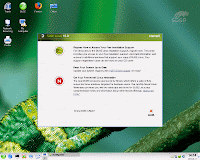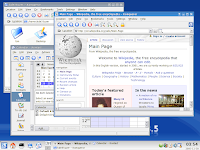[Basics] All you need to know before trying Linux
(Updated 02/21/07) - Many books have been written about Linux. Some of them are good, but - judging based on what I've read - most of them talk about things that you could have figured out by yourself such as "how to use a web browser on Linux". They also fail to mention some stuff that I think is essential. Are you considering trying out Linux? This is what you need to know.

Distributions
Since the source code of Linux is available for everyone to copy, correct, modify and reproduce, there are many flavors of Linux. They are called distributions. As you can see on the pictures above, they can look very different but keep in mind that that's not always the case. There's no distribution that's considered to be "the best one available"; this is a personal matter. If you have no idea what distribution to pick, you can do a free online test to see which one's right for you.
Downloading Linux
If you download a Linux distribution, it is most likely that the file you're downloading has a .iso extension. If you're not familiar with these files: it's like a CD/DVD template. If you import such files into your CD burner, the program will know exactly what to burn on your CD/DVD. This eliminates the need to download and burn every single file on the CD manually. Don't have a CD burner that supports ISOs? No problem, there are plenty of freeware applications that can do this for you. Personally, I prefer CDBurnerXP Pro.
Installing Linux
Hopefully, you've been able to burn the ISO you just downloaded. Now you'll have to reboot your PC and boot from the CD/DVD you just burned. If you're lucky, your BIOS has a boot menu where you can choose from what drive the system should try to boot. More information about booting CDs can be found in your BIOS manual.


Window managers
KDE and GNOME are what we call "window managers". Depending on which one you use, your desktop, task bar and windows will look and function different. Most graphical Linux distributions come with a customized version of either KDE (screenshot 1) or GNOME (screenshot 2). They can also be installed at the same time as they don't conflict with each other. Again, this is a personal thing; some people prefer KDE, some prefer GNOME. If you like eyecandy and flexibility, I advise you to try KDE. If you'd rather keep it simple, try GNOME instead.

Software management
Compare this with the Software applet in the Control Panel on Windows. While Windows only maintains a database of what software is installed on your computer, a majority of Linux systems has developed a complete software management system. Imagine: you've just downloaded a new application (on Linux, we call them "packages") When installing a package, your computer unpacks the files, puts them in the right place and - in most cases - creates shortcuts to your newly installed application. But here's the cool part: once there's a new version available for one of your installed applications, your Linux system can download and install it without bothering you at all! Removing a package is also a fully automated process that doesn't require interaction.
Administrators
There are a few things you should know about this:
- On Linux, administrator accounts are known as superusers.
- While you might be able to install certain programs on Windows without administrator rights, normal Linux accounts have less priviledges. That's why Linux is so secure.
- The primary superuser on Linux is called root.
- Every time you try to do something normal users aren't allowed to do, you will be asked for the root password.
- Never use the root account is your primary account.

The downside: wireless support
If there's one thing that Linux can't do very well, is detecting wireless cards. I've been looking around for years for a way to get wireless access on Linux. This is not Linux' fault. Most wireless card manufacturers simply don't supply Linux drivers with their products so people have to make them by theirselfs. But things are changing. Some time ago, I installed a new version of Ubuntu on my PC that detected my wireless card without any difficulties at all. If you're using LAN cables to connect to the internet, you're lucky since most of these devices are supported.
Stuck? Don't know how to do something?
You're not alone. There are many communities that help hundreds of people every day with their Linux problems. Not every single one of them is as big as that, but you should get a reply to you question within a day on most (popular) forums. Here are some links to communities that might be able to help you with your problem: General Linux, [U/Ku/Edu/Xu]buntu, openSUSE, Fedora Core.
Labels: basics, download, Fedora, GNOME, install, ISO, KDE, Kubuntu, Linux, openSUSE, package management, packages, software management, Ubuntu, window managers




